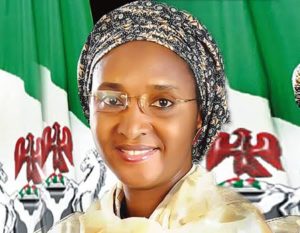
By Chioma Obinagwam
In response to the International Monetary Fund’s recommendation that Nigeria increases its revenue through tax, Finance Minister Zainab Ahmed has said the country has no plans to effect any such hike.
Speaking with Nigerian journalists on the participation of the Nigerian delegation at the annual meeting of the IMF and the World Bank in Bali, Indonesia,
Responding to a question on the recommendation of the fund, the minister said, “To change the taxes means we will review the tax laws, that may be a process we will address in the future. Right now we don’t have any plan to review upward taxes in Nigeria. We don’t have such plans. Instead what we are trying to do is to identify people who are supposed to pay tax but they are not paying.

“A lot of effort is being put to expand the tax base as well as improving the tax collecting processes and it is already yielding results. We have seen our tax base grow from 13 million to 19 million. That number is not enough for a country of 185 million but we are doing a lot of work in this regard,’’ she stated.
She said though the Voluntary Assets and Income Declaration Scheme (VAIDS) was implemented and phased out in June, the rigour contained in the VAIDS programme is still ongoing.
“The discussion we had with IMF managing director included the concerns around what is going to happen to the economy because of the elections. So what we did was that we assured them that we have directive by the president to focus on the economy,’’ she said.
She further disclosed that a committee had been set up by President Muhammadu Buhari on revenue mobilization to ensure that all revenues are reported in a transparent manner.
The minister said the committee is working to support Federal Account Allocation Committee (FAAC) and that they have agreed on new reporting template for Nigeria National Petroleum Corporation (NNPC) which is still being negotiated.
“NNPC has reviewed the template and made its input and FAAC has also reviewed the template. It has to be agreed and then NNPC will start reporting in that template. The essence is for NNPC to make its reporting more granular so that more information will be provided,’’ she revealed.
On debt challenges
The minister also reassured that the country does not have a debt problem because at the ratio of 3 percent of GDP, it is one of the lowest debt, “in fact the lowest debt among our comparative countries.”
She said, “What we have is a revenue problem and we need to work to increase our revenue to ease our debt service obligations. So we have to enhance our domestic revenue mobilisation so that we can ease the debt service burden that we now carry.
“We have a lot of headroom to borrow but we are not rushing to borrow more because we have to consider the foreign debt service that we carry.’’
Also reacting to the IMF/ World Bank call to build fiscal buffers, Ahmed concurred that the country is in a situation where it has to consider increasing building fiscal buffers because though the global economy is going positively upward there are still a lot of fragilities.
She said, “The next wave of recession that might hit the global economy might not be the one that any country can quickly come out from unless the country has sufficient buffers.
“So as a country, both the federal and the states, we have to look at how to save more and we have to look at how to invest more in critical infrastructure that will yield revenue and that is what came across throughout the meeting from the World Bank, from the IMF, that all countries, not just Africa but globally, need to build more fiscal buffers.”
The minister noted that there are only a few countries in the world that have saved so much that any shock will not affect them.
“So we have to do this to protect ourselves from external shocks that we are now seeing coming from increase in rates in the US and some of the shocks we can get also nationally. And some of those shocks are shocks caused by natural occurrences. So we all need to be really ready,” Ahmed stated.
Investing in human capital development
The Minister for Budget and National Planning, Senator Udoma Udo Udoma, reacting to the poor scoring of Nigeria on the newly released human capital index (HCI) said, “Where we are today is not where we want to be. But it is the result of cumulative neglect over a period of time and one of the things in the Economic Growth and Recovery Plan (ERGP) that we clearly identified is that we need to clearly invest in our people. And we are doing so but it takes time.’’
Choosing between reserves and currency depreciation
Reacting to the call by the IMF to spend foreign reserves judiciously in the face of the normalization of the interest rates in the United State, Central Bank (CBN) Governor Godwin Emefiele in his briefing said, “For Nigeria, we have lost reserves only by a margin, in my view, and at the same time, we have managed to sustain stability in our foreign exchange market.
“I think we have done a very good job; not only trying to maintain a stable exchange rate, but trying to avoid depreciating our currency so far in this early days of normalisation.’’
“We are going to need to build buffers but unfortunately I must say that we are in a period where it is difficult to talk about building reserve. You can only build reserve buffers if you want to hold on the reserve, while allowing your currency to go and wherever it goes is something else.
“It is a choice we have to make and at this time, the choice for Nigeria is to maintain a stable exchange rate so that businesses can plan and we don’t create problem in the banking system assets.”
On building investors’ confidence ahead of elections
The Acting Director General of Securities and Exchange Commission, Mary Uduk, said having foreign investors is good as they bring in liquidity and efficiency, and transparency in the market.
She also said the commission was encouraging local investors by giving them confidence in the market.
She said the commission is looking to increase and encourage the commodity ecosystem as well as to introduce derivatives in the market.
“As we speak, our rules on derivatives are ready and we are building internal capacity to supervise all of these,” Uduk said.







Leave a comment